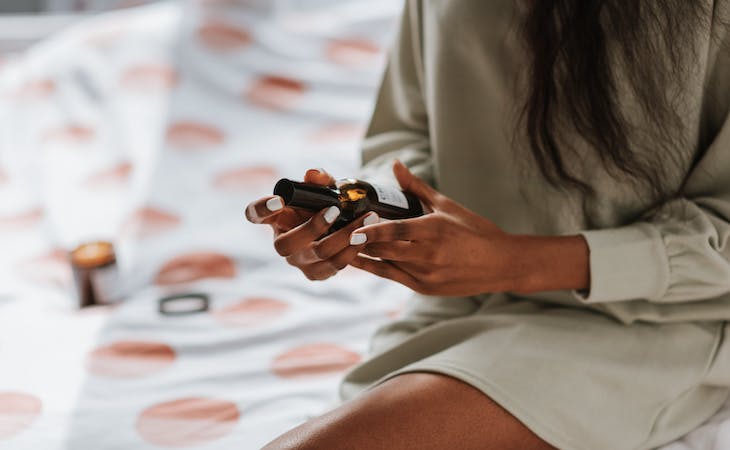Do you have trouble getting a good night’s sleep? Spraying your pillow might be the answer. A pillow spray (also called pillow mist) is a solution made of water and essential oils. You spray the mist on your pillow before going to sleep.
According to devoted fans, pillow sprays help you fall asleep more quickly, sleep soundly, and feel refreshed in the morning.
But do pillow sprays really work—or is this just wishful thinking? Science tells the real story. Let’s take a look at the evidence behind whether a pillow spray can improve your sleep.
Do pillow sprays work?
There aren’t any scientific studies proving pillow sprays work. However, there are studies focused on aromatherapy showing certain scents can help improve sleep—so it stands to reason that if you purchase a spray including one of these scents, it might help you get a better night’s rest.
A 2017 study looked at patients in an intensive care unit (ICU), where it can be difficult to get quality sleep. The participants in the study inhaled the two percent lavender essential oil. When the results were in, these patients enjoyed an increased quality of sleep and reduced level of anxiety thanks to the essential oil.
Another study performed in 2020 gave lavender oil aromatherapy to menopausal women, who often have trouble sleeping. The study discovered aromatherapy with lavender-scented steam inhalation increased sleep quality.
In total, there have been over 30 studies from 2011 to 2019 that have looked at sleep quality in adults and whether aromatherapy could help. A systematic literature review of these studies found aromatherapy can help improve sleep quality and reduces stress, pain, anxiety, depression, and fatigue in adults and elderly people.
Best ingredients to look for in a pillow spray
Most pillow sprays have simple ingredients. Generally, water and essential oils are the primary two ingredients (along with other ingredients intended for scent). The best ingredients in a pillow spray for sleep include:
- Lavender. The science backs it up: Lavender oil can help improve your sleep quality, plus decrease your heart rate and blood pressure.
- Chamomile. A recent study found inhaling a blend of chamomile and lavender decreased anxiety and depression in older adults.
- Cedarwood. Cedarwood oil calms down your sympathetic nervous system (which controls your heart rate and adrenaline).
- Jasmine. After sniffing jasmine, you might see your nighttime sleep quality and morning cognitive function improve.
- Sweet orange. Citrus scents can help relax your body and mind, making it easier for you to fall asleep.
Best pillow sprays to try
Looking for the best pillow sprays to try? Select a product from the list below.
- Thisworks Deep Sleep Pillow Spray ($30): Made with lavender, chamomile, and vetivert (a type of grass used as aromatherapy for anxiety and insomnia), 98 percent of users surveyed felt more refreshed in the morning after using this spray.
- Asutra Lavender & Chamomile Aromatherapy Spray ($13.49): Asutra’s pillow spray comes in multiple scent options and is made with vegan, nontoxic ingredients designed to help you relax and unwind.
- Moonlight Skincare Sleepy Spritzzz Facial Toner & Sleep Mist ($32): This two-in-one product works for your face and your pillow. The witch hazel and aloe vera are great for acne-prone skin, while the chamomile and lavender essences create a calming fragrance for your pillow.
- DRMTLGY Linen Spray — Lavender ($15): Add this lavender pillow spray to your pillows and bedding each night to help relieve stress as you fall asleep. Other ingredients include chamomile, witch hazel, and jojoba oil.
- Sephora Sleep Mist ($32): Sephora’s lavender and chamomile spray creates the perfect atmosphere for some shuteye.
How to use a pillow spray
Using a pillow spray is simple: The product will come in a small spray bottle, and all you’ll need to do is shake the bottle and then mist it over your pillow from a few feet above (and, if desired, your pajamas and/or sheets) before going to sleep.
Don’t overdo it—normally, just a few spritzes will be enough for a pillow. If you wake up in the middle of the night and can’t fall back asleep, however, you can try spraying your pillow again.
Pro tip: If you have a silk pillowcase, consider spraying your pillow mist into the air instead of directly onto the fabric to avoid stains.
How to make a pillow mist spray
Store-bought pillow sprays might be helpful, but they can also be a bit of an investment. If you’re on a budget and want to try out a low-risk pillow spray first, use this recipe from essential oil brand Cliganic to make your own at home.
Ingredients
- 2 ounces distilled water
- 1 drop peppermint essential oil
- 7 drops lavender essential oil
- 4 drops lemon essential oil
Instructions
Add the water to an empty spray bottle; then add the three essential oils. Close the bottle and shake well. Before you go to bed, spray on your pillow and anywhere else desired.
FAQs
What spray helps with sleep?
Pillow sprays that include essential oils such as lavender and chamomile can help with sleep. The calming scents help your mind and body relax for the night.
What can I put on my pillow to help with sleep?
Pillow spray (also called pillow mist) can go on your pillow to help with sleep. You can purchase a pillow spray or make your own. You’ll use the small spray bottle to mist the solution over your pillow before going to sleep.
What is the use of pillow mist spray?
Pillow mist spray is designed with calming ingredients to help your mind and body relax before bed so you can enjoy better quality sleep and feel more refreshed in the morning.
Still having trouble catching Z’s? Here’s what to do when you can’t sleep.




